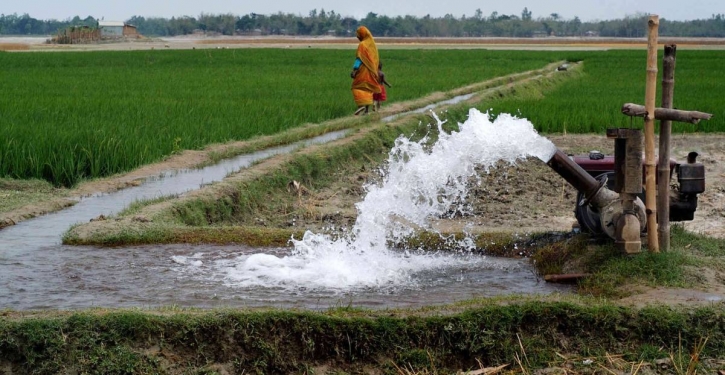Govt should cut diesel price to benefit farm production: CPD
BI Report || BusinessInsider

A diesel-run irrigation pump is seen being used at a farmland. Photo: Collected
The Centre for Policy Dialogue (CPD), a civil think tank, has recommended reduction in diesel and kerosene prices to tone down the cost of farm production and transportation expenses for farm products.
The CPD said a higher diesel price enhances the cost of cultivation, transportation and processing of farm products. As a result, the prices of the products go up.
Besides, the think tank also recommended measuring actual demand for rice in the country.
Rice production has gone up and imports have also increased. But they don’t have any impact on the market. Rice prices are increasing. As a result, it is time to see the actual demand for rice in the country, said CPD Executive Director Fahmida Khatun.
The recommendation followed as CPD reviewed the ‘State of Bangladesh Economy in Fiscal 2021-22,’ on Thursday.
Fahmida Khatun made the keynote address--- at a press conference held at CPD office in Dhanmondi--- citing the recommendations.
Fellow Professor Mostafizur Rahman, Senior Research Fellow Taufiqul Islam Khan and Research Director Khandaker Golam Moazzem were present and responded to various questions.
In Fahmida’s report, CPD suggested that the government opt for a focused and targeted expansionary fiscal policy to be reinforced by accommodative monetary policy for better economic growth.
An ‘Independent Review of Bangladesh’s Development ( IRBD)’ report says, “Given the current context, a targeted flow of fiscal resources towards the more vulnerable households alongside the relatively small (and informal) enterprises will generate more ‘aggregate domestic demand augmenting’ effect and offer some protection to the marginalised groups.”
According to the report, the credit uptake growth is still below the government set target of 14.8% and the ‘central bank should not be seen as crowding out the private sector from the credit market.’
CPD advised to retain the 2% cash incentive on inward remittance and encourage investment in wage earners’ bonds to dissuade the transfer of money through informal channels.
The report reviewed the performance of key macroeconomic indicators for the early months of the ongoing fiscal year.
In her paper Fahmida said some indicators of the economy like export earnings, revenue collection are positive. Again, some indicators such as remittances, investment, distribution of incentives to small entrepreneurs, inflation, balance of transactions, implementation of annual development programmes look bleak.
Apart from this, the prices of some products in the international market are on the rise. “As a result, there is a kind of challenge in the macro-economy,” she said.
In such a scenario, she advised the government to sponsor an expansionary monetary policy, arguing that small entrepreneurs who have suffered losses in the Coronavirus pandemic should be given opportunity to expand their investment.
“Therefore, it is important to end the ongoing incentive packages. It is not advisable to take a new package without exhausting the current one,” Fahmida said.
Professor Mostafizur Rahman said the volume of subsidy will increase due to the increase in the prices of fertiliser and energy in the international market. If the government cannot provide subsidies on its own, it will have to adjust the prices which remain a big challenge for them.
It is now imperative to build institutional capacity to deal with the financial crisis. In the new 2022, the economic risk will increase.
Khandaker Golam Moazzem said, “Recovery from Cronavirus is being prolonged. During the pandemic, the position of some business groups had been strengthened.
He recommended strengthening the Competition Commission, Bangladesh Bank, Bangladesh Securities and Exchange Commission.
The CPD said the big entrepreneurs availed the government announced incentive packages on time. The debtors got relieved. But many small and medium enterprises did not get any money declared by the incentive packages. The central bank has asked banks to provide incentives to the victims but has not defined them. As a result, banks are choosing customers as they see fit. Incentive money did not go to the right place due to weakness in policy.
























